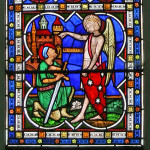We run our website the way we wished the whole internet worked: we provide high quality original content with no ads. We are funded solely by your direct support. Please consider supporting this project.

God Made Visible
During Advent, we celebrate and bring to the forefront of our imagination the God who was made visible. The Gospel of John sums up the advent of God with one sentence: “And the Word became flesh and lived among us, and we have seen his glory, the glory as of a father’s only son, full of grace and truth” (Jn 1:14).
“The Word” refers to God’s thinking and his self-expression. When God thinks, it is Jesus. When God expresses himself, it is Jesus. Notice the singularity of the claim. Jesus is not one Word among others, as though God had more than one mind and more than one mouth. Rather, wherever and whenever God thinks and expresses himself, it is Jesus Christ.
Moreover, it has been this way throughout eternity. The Word is not created. He was “in the beginning with God” and is himself God (Jn 1:2). He has been fellowshipping with the Father from all eternity (Jn 17:5, 24). This means that in knowing Jesus, we are not knowing someone “one step removed” from God. In knowing Jesus we are knowing God himself, God in his eternal essence. In seeing Jesus, we are seeing the very heart of God.
In fact, far from being created, the Word is actually the Creator. John tells us that everything was made by the Word, through the Word, and for the Word (Jn 1:1-3). Creation exists, in other words, as an expression of God and for the purpose of people knowing God. Creation’s purpose is found in Jesus Christ.
The Word is the life and the light of all people (Jn 1:4). God wants people to know him and share in his life (Jn 17:3). Whenever and wherever people experience true life and true light, it is Jesus Christ, whether they know it or not (Jn 1:4, 9). Whereas the enemy covered up the true God in a veil of deceptive darkness that brought death, Jesus turns the light on so we can see who God really is. In doing this, Jesus gives life.
In Christ, we see the glory, the beauty, the fullness, the truth of God. Even though no one previously had ever seen God’s eternal, transcendent nature, now in the Word of Jesus Christ God is made known (Jn 1:18). The invisible God is made visible. In Christ, the previously concealed God has been unambiguously revealed.
—Adapted from Is God to Blame? pages 26-28
Image by Clarisse Meyer via Unsplash
Category: General
Tags: Advent, Glory, Incarnation, Jesus
Related Reading

A Dialogue with Derek Flood Part 2: Is ALL of the Bible Inspired?
Image by TheRevSteve via Flickr Yesterday, I offered the first part of my response to Flood’s comments regarding my review of his book. Today I’ll finish up my thoughts. Scripture and Its Interpretation Flood confesses that he is confused as to how I can claim that “in the light of Christ, we must reject violent interpretations of Scripture”…

The Jesus Seminar and the Reliability of the Gospels
The Jesus Seminar The primary driving force behind the popular media’s present preoccupation with liberal views of Jesus has been the Jesus Seminar. This Seminar, first convened in 1985 by Robert Funk, is a gathering of 100 or so mostly liberal New Testament scholars who meet on a regular basis. They have determined, by a…

The Violent “Church Triumphant”
In light of how central enemy-loving non-violence is to Jesus’ teaching and to his cross-centered revelation of God, we have to wonder why the church has refused to listen to its head and instead condoned violence, as pointed out in the previous post? Christian theologians have used OT’s violent portraits of God, at least since…

Is God Immutable? Part I
For a number of reasons, Plato believed that something changes only to become better or to become worse (Rep. II). Since a perfect being can’t be improved or diminished, he argued, God must be completely unchanging, As this idea was developed over time, Plato’s followers concluded that not only must God’s character be unchanging, but…

Lies, Truth, and the Holy Spirit
The root of the flesh is a lie about who God is and who we are. Satan brings us into bondage of the flesh by convincing us that God is not the loving God he says that he is. In doing this, Satan convinces us that we cannot find fullness of life by being wholly…

Following Jesus from the Margins
D. Sharon Pruitt via Compfight Kurt Willems posted a reflection today entitled From the Margins: Following Jesus in a post-Christian culture. I hope everyone will read this. It’s a perspective from the anabaptist tradition that finds inspiration from the same data that evangelicalism finds alarming. May we all follow Jesus from the margins and offer…
